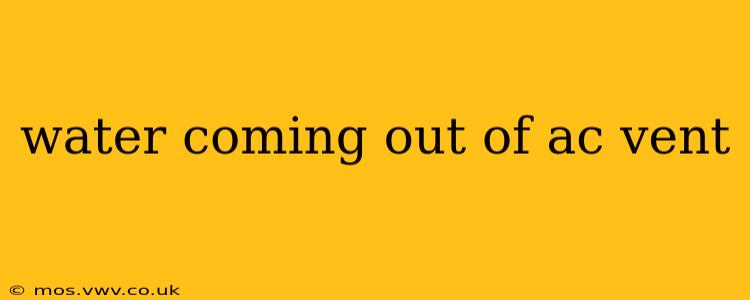Finding water leaking from your air conditioning vent is alarming, but it's a common problem with several potential causes. This guide will help you diagnose the issue and find a solution, saving you potential damage to your home and costly repairs. Understanding the source of the leak is key to fixing it effectively.
Why is Water Coming Out of My AC Vent?
This seemingly simple question often has multiple answers. The source of the water could be related to condensation, a clogged drain line, a refrigerant leak, or even a problem with the air handler itself. Let's explore the most common causes:
Condensation Buildup:
This is the most frequent culprit. Your AC unit removes moisture from the air, and this moisture collects as condensation. Normally, this condensation drains away via a condensate drain line. However, if the line is clogged, the water backs up and can overflow into your ductwork, eventually leaking from a vent. This is often accompanied by a musty smell.
Clogged Condensate Drain Line:
As mentioned above, a blockage in the condensate drain line is a prime suspect. The line can become clogged with algae, mold, mineral deposits, or even dirt and debris. This prevents the condensation from draining properly, leading to a backup and leakage.
Refrigerant Leak:
While less common, a refrigerant leak can also cause water to appear near your AC vents. Refrigerant is crucial for the cooling process, and a leak can cause the system to freeze up. This freezing can lead to ice formation which, when it melts, can create water dripping from vents. This scenario often presents with reduced cooling efficiency.
Leaking Ductwork:
Sometimes, the problem isn't within the AC unit itself, but rather a leak in the ductwork. Cracks, holes, or poorly sealed connections in your duct system can allow condensation or water from other sources to enter and leak out from a vent.
Problems with the Air Handler:
The air handler (the indoor unit of your AC system) houses several components that could leak. A faulty drain pan, a crack in the housing, or a malfunctioning drain pump could all contribute to water leaking from vents.
What to Do if Water is Coming Out of Your AC Vent?
First, turn off your AC system immediately to prevent further damage. Attempting to diagnose and fix the problem yourself is only advisable if you have experience with HVAC systems; otherwise, calling a qualified HVAC technician is strongly recommended. Incorrectly addressing the issue can exacerbate the problem and lead to more significant expenses.
However, you can take some initial steps:
- Check the Condensate Drain Line: Look for visible blockages and try to clear them cautiously. Never use harsh chemicals, as this can damage the line and your system.
- Inspect the Drain Pan: If you can safely access the drain pan within the air handler, check for any clogs or cracks.
- Look for Leaks in the Ductwork: Examine the visible sections of your ductwork for signs of leaks, cracks, or holes.
How Much Does it Cost to Fix Water Leaking From an AC Vent?
The cost to repair a water leak from an AC vent varies significantly based on the cause and the extent of the damage. A simple clog in the drain line might only require a minor cleaning, while more significant issues like a refrigerant leak or extensive ductwork repair can be far more expensive. Expect costs to range from a few hundred to several thousand dollars.
How Can I Prevent Water From Coming Out of My AC Vent?
Preventative maintenance is crucial. Schedule regular inspections and maintenance of your AC unit, including cleaning the condensate drain line. This simple step can significantly reduce the risk of water leaks.
By understanding the potential causes and taking appropriate action, you can effectively address water leaking from your AC vent and ensure a comfortable and functional home cooling system. Remember to always prioritize safety and call a qualified technician when necessary.
